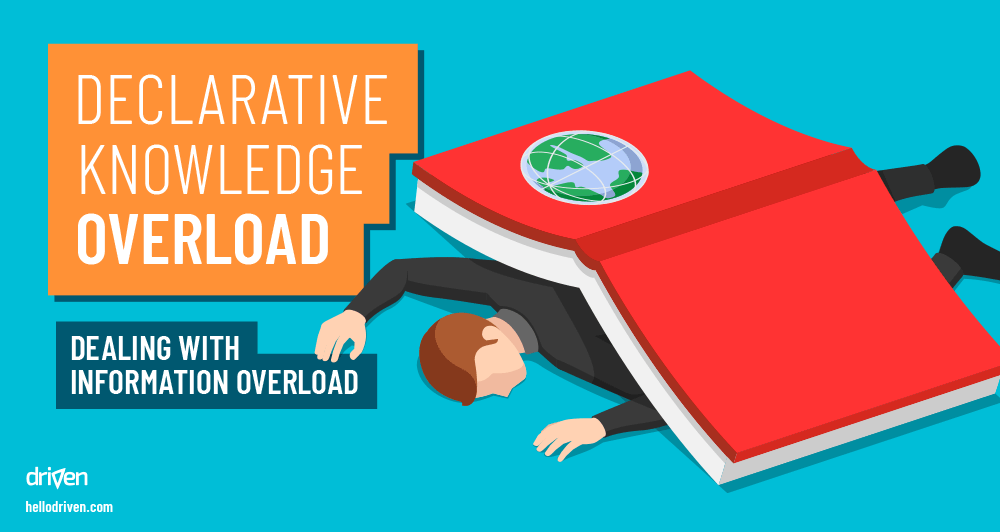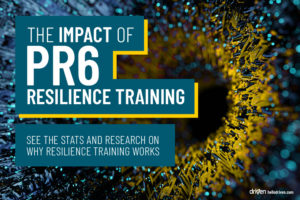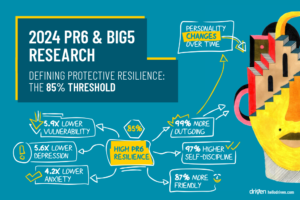DKO. The knockout punch that cognitively floors us every day. Declarative Knowledge Overload is the natural result of the increasing availability and ease of access to information: quite simply, we are no longer living in the age of information – we are now living in the age of information overload.
And with this overload comes nasty side effects that are becoming ever more noticeable. Before we explore those side effects, let’s take a step back and consider two forms of knowledge:
Declarative knowledge – This form of knowledge is available to the conscious brain. You can verbalise and contemplate it. This is about knowing ‘that’. For example, you may know that to ride a bike means pedaling and keeping your balance by steering.
Procedural knowledge – Knowing what it takes to ride a bike doesn’t mean you can actually ride one! This is where procedural knowledge is about knowing ‘how’. Here the brain learns how to perform the pedaling and steering motions to keep you upright and riding.
Procedural knowledge is hard to verbalise. Think of trying to explain to someone how to keep their balance on the bike. There’s no way for you to just transfer your procedural knowledge to someone else – they can take your pointers, but they will have to practice on their own.
Neural Knowledge Transcription
How can we keep up when there is a bunch of new articles and studies coming out every week with more things we absolutely must know?
HM was extensively studied until his death in 2008, and his legacy added a great deal to our understanding of knowledge transcription. An interesting discovery is that procedural knowledge can form independently of declarative knowledge. That means HM could learn a new motor skill without remembering that he learnt it. For example, HM could spend weeks learning how to knit, and each time he wouldn’t know that he can knit – but be surprised to find out he knows how!
Declarative knowledge needs the hippocampus which handles the initial information storage, which is then transcribed to other cortical areas where it becomes long-term memories.
Procedural knowledge skips the hippocampus, as there are deeper brain structures directly involved with performing the action. For example, the basics of riding a bike sits much deeper in the motor cortex, refined through the cerebellum in the back of the brain.
The frontal cortex through its executive function can decide which way to steer and how fast, but doesn’t actually know how to maintain balance as you pedal. Declarative knowledge can result in procedural knowledge through knowing what is possible. For example, knowing that it is possible to ride a bike can lead you to practice riding it until you know how.
HM Reversed
This concept translates well to the modern world. For example, a manager might learn about a new study on how to manage staff. With the manager now knowing that it is possible to get some outcome, the manager can start practicing how to apply that technique.
Simple! In theory…
In reality, it is here that we start to see the effects of information overload. Through a digital explosion of information at our fingertips, we now get so much input that the brain can’t keep up with turning relevant declarative knowledge into procedural knowledge.
And how could it? If it takes months to practice a new technique or skill, so how can we keep up when there is a bunch of new articles and studies coming out every week with more things we absolutely must know?
What we are increasingly experiencing is somewhat like a reverse of HM’s case. Instead of HM’s hippocampus that cannot form new knowledge while still forming procedural knowledge, our hippocampi are so overloaded with new information that we form a lot of new declarative knowledge, but very little new procedural knowledge.
Simply, we know that many things are possible, but we are not practiced in how to achieve it.
DKO’d
While the brain struggles to figure out what new knowledge is worthy of implementation and practice, we stand by, frozen in place. This is the knockout punch of DKO – Declarative Knowledge Overload.
You see, this is the brain’s brilliant solution to information overload, because the brain has realised something that many of us haven’t: regardless of what we do today, the world will still continue tomorrow. So why should the brain bother to change its ways when it can just do nothing instead? Besides, information to the contrary might come out tomorrow, so it’s actually prudent to do nothing…
Go out of your way to find out if you might be wrong about something
Rather than practicing new skills, we instead build up an ever-growing declarative knowledge database that makes us feel like we know a lot. This is a big challenge with DKO – it can make us feel like we are making progress, when in reality we are not. Constantly learning new things doesn’t mean anything if you don’t put it into practice.
DKO Hits Us All
DKO is about unintegrated and unimplemented declarative knowledge. Consider some consequences of DKO through information overload:
Uncritical investigation reinforces bias. DKO makes us resistant to critical investigation. Many people think that increased availability of information will increase our collective understanding and compassion for each other. But not all information is equal. There are good ideas, bad ideas, and everything in-between. The amazing thing about information overload is that you can find substantial evidence to prove whatever you want to believe in. Still believe in a flat earth? Well, there are big groups out there with lots of flat earth info for you! People naturally look for more of what they believe in – which just reinforces bias. If you don’t go out of your way to find out if you might be wrong about something, then you may never improve your worldview.
A post-truth world. This term is becoming more prevalent, and it represents a key component of DKO: Why should we be outraged about something if there are so many alternative views? Who knows what’s really the truth anymore? And most likely something worse will just happen tomorrow. This is why many in politics and even business now skip the facts and focus on saying things that elicit emotion. Emotion can at least still inspire some action and support, even if the information flies in the face of reality. Back to our previous point, as long as the information agrees with an existing bias, then that is as much truth as many need these days.
The well-informed who stick to their ways. Think of the executive or manager who devours all the latest Harvard Business Review articles. Well-read, this person is quick to cite some study in order to look smart or shoot down an idea. Yet for all his knowledge, he still does things the same way as he has for the last 20 years. Often people know exactly what they should be doing, but still don’t do it. Many of us fit into this category because it can so often feel like we are doing the right thing by accumulating all this knowledge, except that we are not actually using it.
I see the same effects bleed into wellbeing and resilience training. Many programs shower people with information through seminars, building up declarative knowledge which often doesn’t translate into procedural knowledge – or real lasting change. These programs then measure knowledge afterwards, trumpeting their success, when in reality they have only measured declarative improvements, and not procedural.
Much Ado About DKO
DKO helps us understand the consequence of information overload. It also highlights a key problem with information overload: a lack of putting what we know into practice and developing procedural knowledge. Instead, all the best studies and knowledge in the world is reduced to mere trivia that is never acted on.
Understanding this mechanism of DKO, we can take action to get back up and fight more effectively. Here are three steps to avoid DKO.
Appreciate criticism. Being open for criticism is one thing, but information overload means we need to have an even higher appreciation for criticism. We need to actively look for criticism in our own ideas and the information we are learning about. This will help weed out the bad declarative knowledge, so you have a better idea of what to put into practice. For example, if you are learning about a new concept, go to its Wikipedia page and see if there is a criticism section. Read through that and see if you feel you can adequately address those points. Also, many people agree with whatever they think you believe, so you need to be a little more devious if you want real criticism. For example, if you are considering an idea and talking to a friend or colleague, present an opposing view first. See if they agree with that, then shift to your original idea and see what they say then. If they just agree with whatever you say, then consider that talking to them will mostly reinforce your own biases.
Look for themes. When going through Harvard Business Review and all those other articles and papers, don’t get lost in the detail. You don’t need to become a neuroscientist to apply brain-based management principles, just like you don’t need to be a pilot to know a helicopter doesn’t belong upside down in a tree. What’s more important than a single study or article is if you can see consistent trends in a concept or an idea. This further helps to weed out declarative knowledge with little or no evidence behind it, helping you focus on ideas worthy of your attention.
Integrate & apply. Here you have the opportunity to lead. It is through your own creative combination of different ideas, and putting your integrated ideas into practice, that you can set yourself apart as a leader. This happens by taking critically evaluated themes built on good evidence and following through to develop not just the declarative knowledge, but also the procedural knowledge. This takes courage to do, and you might even find out you were wrong about a thing or two, but the reward is a chance to lead the pack.
As we know from the neuroscience of how the brain changes, it takes time and practice for the brain to change. It’s through this practice that declarative knowledge turns into hard-wired procedural knowledge that we can then rely on – even under pressure. The better we embed these skills in ourselves, the better we can then explain them to others and pass on the knowledge.
You can develop cultural change within an organization by establishing an environment within which others can develop aligned procedural knowledge.
I’ll leave you with a few questions to consider:
Do you see DKO in others?
Do you see people absorb knowledge but not actually change their behaviour?
Do you see DKO in yourself – perhaps learning but not getting around to implementing?
What are you doing to manage information overload (considering that it’s only going to get worse in the future)?
Stay resilient,
Jurie



